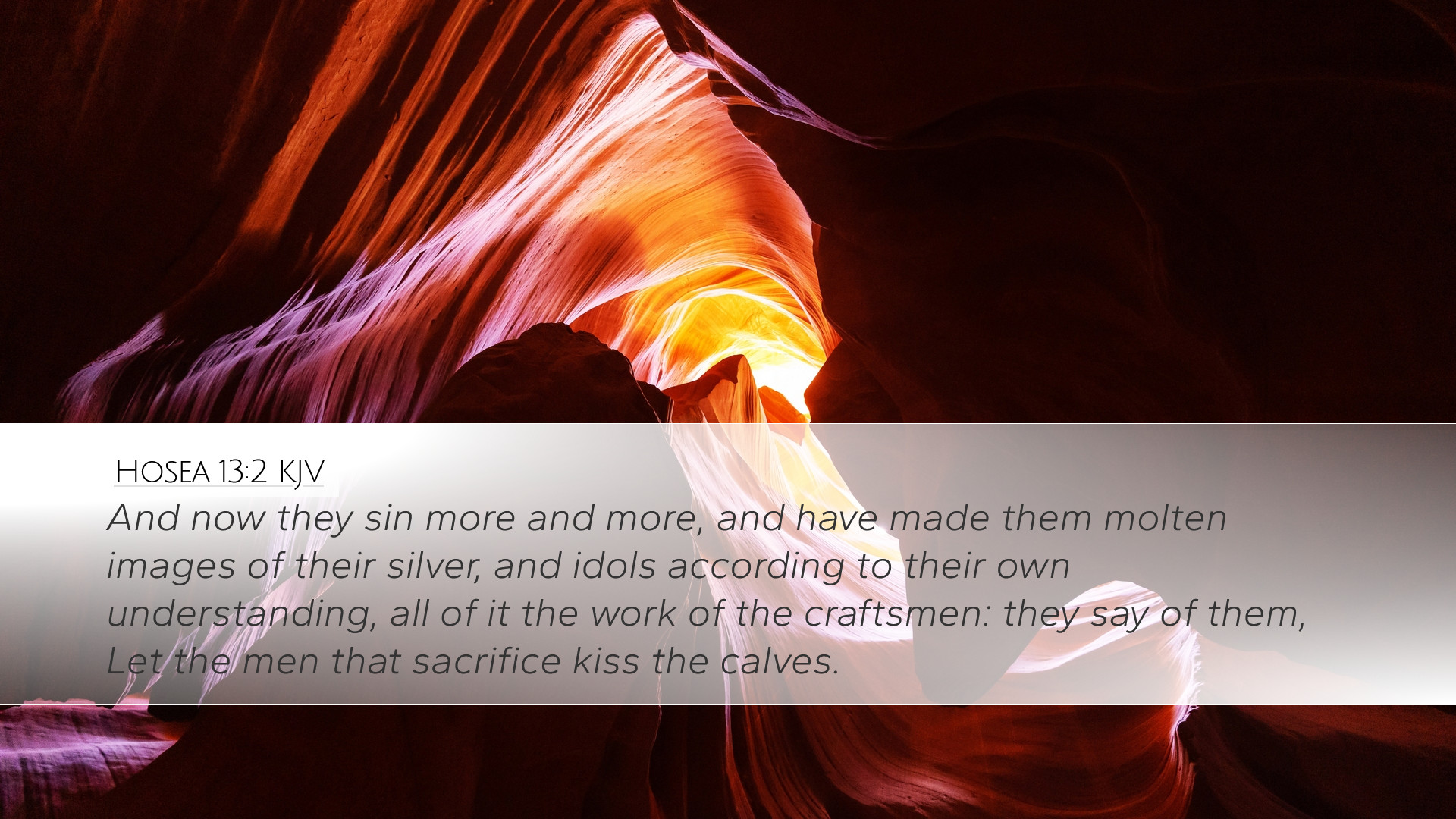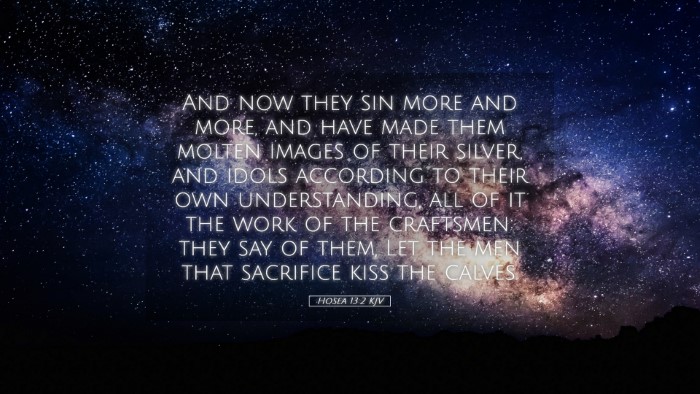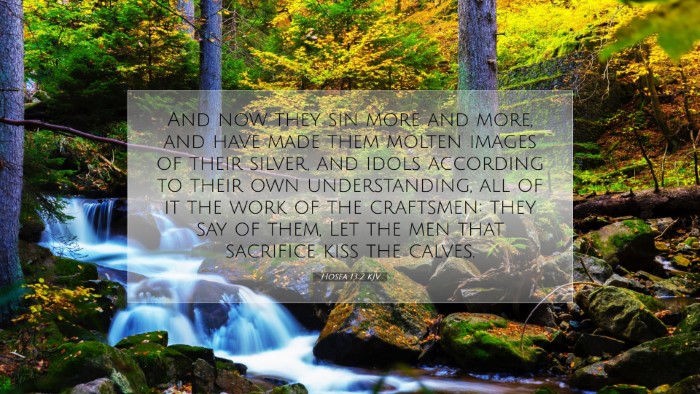Old Testament
Genesis Exodus Leviticus Numbers Deuteronomy Joshua Judges Ruth 1 Samuel 2 Samuel 1 Kings 2 Kings 1 Chronicles 2 Chronicles Ezra Nehemiah Esther Job Psalms Proverbs Ecclesiastes Song of Solomon Isaiah Jeremiah Lamentations Ezekiel Daniel Hosea Joel Amos Obadiah Jonah Micah Nahum Habakkuk Zephaniah Haggai Zechariah MalachiHosea 13:2
Hosea 13:2 KJV
And now they sin more and more, and have made them molten images of their silver, and idols according to their own understanding, all of it the work of the craftsmen: they say of them, Let the men that sacrifice kiss the calves.
Hosea 13:2 Bible Commentary
Commentary on Hosea 13:2
Bible Verse: Hosea 13:2 - "And now they sin more and more, and have made them molten images of their silver, and idols according to their own understanding, all of it the work of the craftsmen: they say of them, Let the men that sacrifice kiss the calves."
Introduction
The profound verses of Hosea reflect the spiritual and moral decline of Israel during the prophet's ministry. Hosea 13:2 serves as a critical verse that exposes the consequences of idolatry and the dark tendencies of the human heart, as understood through the lens of several public domain commentaries.
Commentary Insights
-
Matthew Henry
Matthew Henry highlights the escalating nature of Israel's sin, noting that they “sin more and more” depicts a continuous decline rather than a mere instance of disobedience. This reflects a lack of remorse and spiritual responsibility. The idols they created are attributed to their own “understanding”, emphasizing the folly of relying on human wisdom and craft.
He observes that the phrase “work of the craftsmen” points to the labor and effort poured into constructing these idols, revealing a misguided devotion to the creations of their own hands. He emphasizes that these idols, although formed from silver and expertly made, cannot save, but rather lead to spiritual ruin. The act of kissing the calves represents false worship, a betrayal of the covenantal relationship with God. This act signifies intimacy with what is ultimately empty, positioning these idols as false gods and leading the people further away from Yahweh.
-
Albert Barnes
Albert Barnes takes a deep dive into the concept of idolatry, elucidating that the molten images represent the complete corruption of worship. He stresses that the people had perverted true worship into a form that honored themselves rather than God. The continual sinning is also an indicator of their blindness to the consequences of their actions.
Barnes poignantly notes the irony in worshipping images created by human skill while dismissing the Living God, who delivered them from bondage. He emphasizes the phrase “let the men that sacrifice kiss the calves” as an acknowledgment of the depth of their apostasy, with false worship becoming a conventional practice. This reflects a theological and societal breakdown, illustrating how deeply entrenched idolatry had become in the fabric of their lives.
-
Adam Clarke
Adam Clarke offers a scholarly perspective, explaining the cultural context in which Hosea was proclaiming these truths. He discusses the tendency of ancient cultures to form gods reflecting their own desires and understanding. Clarke emphasizes that in doing so, the Israelites not only broke their covenant with Yahweh but also constructed a religious framework that inherently contradicted the very purpose of their being.
Clarke highlights the symbolism in “kissing the calves”, which is reminiscent of worship practices in surrounding nations, noting that it suggests a submission to false authorities. This profound act indicates how far they had drifted from recognizing the sovereignty of God, trading authentic relationship for a deceptive imitation. He suggests that such a transition in worship bears a significant warning for contemporary believers about the nature of faith and devotion.
Theological Reflections
This verse serves as a sobering reminder of the dangers associated with idolatry. The compulsion to fabricate gods that align with personal desires is not only an ancient problem but a contemporary challenge that can ensnare even the faithful.
Idolatry in Modern Context
- The idols of today may not be made of metal or stone, but can manifest as material possessions, societal values, or even personal ambitions that take precedence over one's relationship with God.
- The narrative in Hosea compels church leaders and believers alike to critically examine their lives for areas where they may be compromising their faith in favor of something that cannot fulfill—be it cultural norms, financial success, or personal achievements.
Spiritual Implications
The warnings in this passage remind us of the principle that what we sacrifice our time, energy, and affections to ultimately shapes who we are. True worship must be rooted in the acknowledgment of God's sovereignty, holiness, and mercy.
Concluding Thoughts
Hosea 13:2 intricately illustrates the progression of sin through idolatry and the dangers therein. The collective reflections of Matthew Henry, Albert Barnes, and Adam Clarke offer rich insights into the spiritual, social, and theological implications of the text. As pastors, scholars, and students of the Word, it is vital to engage with these teachings, ensuring that worship remains centered on the true God, transcending the seductive allure of idols.
Call to Action: Reflect upon the idols present in your own life and community. Engage in dialogue about the means by which the church can remain vigilant against the allure of idolatry, reiterating the importance of true worship in the light of our covenant relationship with God.


